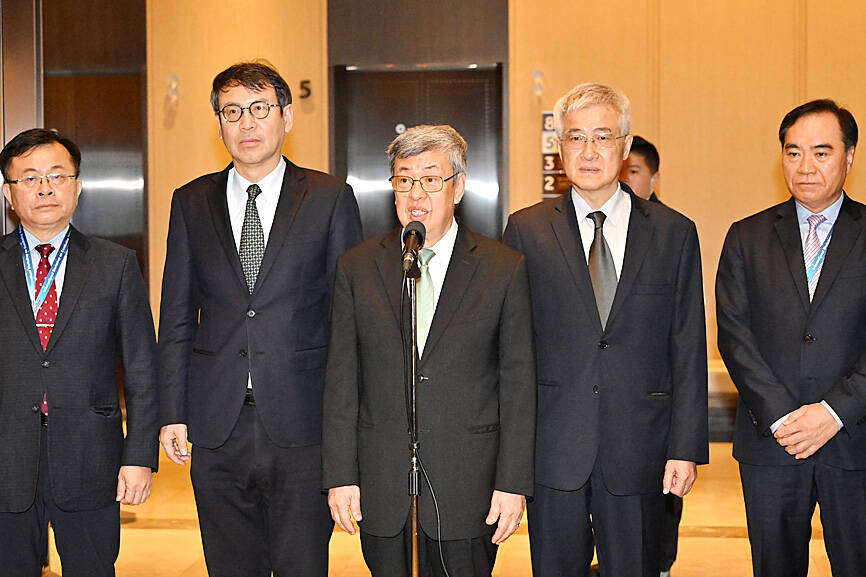A civil servant pension reform plan proposed by Chinese Nationalist Party (KMT) lawmakers would destabilize the current system and put government workers at greater financial risk, Premier Chen Chien-jen (陳建仁) said yesterday,
Chen made the statement before attending the opening ceremony of the Global Cooperation and Training Framework’s International Workshop on Combating Cross-Border Fraud, in response to media queries for comment on the amendment to the Act Governing Civil Servants’ Retirement, Discharge and Pensions (公務人員退休資遣撫卹法) proposed by the KMT caucus.
The proposed amendment would freeze this year’s decrease in the income replacement ratio for retired teachers and government workers.

Photo: Tien Yu-hua, Taipei Times
The ratio has been reduced for five consecutive years.
Chen said he respects lawmakers’ rights to propose amendments but added: “I want to remind them that it is not easy to build a good pension fund system. The pension fund reform we proposed was accepted by all, and we have adjusted retirement fund payments for retirees based on the changes of the consumer price index each year.”
“We hope that the amendments proposed by KMT lawmakers will not destabilize the current pension fund system, which would put retired civil servants, teachers and military personnel at greater financial risk,” he said. “That would be the last thing anyone wants to see.”
President Tsai Ing-wen (蔡英文) pushed for a reform of the pension fund system for civil servants, teachers and military personnel when she took office in 2016, Chen said, adding that the goal is a sustainable system in which retirees can continue receiving retirement funds while they are alive.
“We want to thank all the government workers and teachers who support the pension fund reform, which helps preserve the system,” he said.

Taiwan is stepping up plans to create self-sufficient supply chains for combat drones and increase foreign orders from the US to counter China’s numerical superiority, a defense official said on Saturday. Commenting on condition of anonymity, the official said the nation’s armed forces are in agreement with US Admiral Samuel Paparo’s assessment that Taiwan’s military must be prepared to turn the nation’s waters into a “hellscape” for the Chinese People’s Liberation Army (PLA). Paparo, the commander of the US Indo-Pacific Command, reiterated the concept during a Congressional hearing in Washington on Wednesday. He first coined the term in a security conference last

Prosecutors today declined to say who was questioned regarding alleged forgery on petitions to recall Democratic Progressive Party (DPP) legislators, after Chinese-language media earlier reported that members of the Chinese Nationalist Party (KMT) Youth League were brought in for questioning. The Ministry of Justice Investigation Bureau confirmed that two people had been questioned, but did not disclose any further information about the ongoing investigation. KMT Youth League members Lee Hsiao-liang (李孝亮) and Liu Szu-yin (劉思吟) — who are leading the effort to recall DPP caucus chief executive Rosalia Wu (吳思瑤) and Legislator Wu Pei-yi (吳沛憶) — both posted on Facebook saying: “I

The Ministry of Economic Affairs has fined Taobao NT$1.2 million (US$36,912) for advertisements that exceed its approved business scope, requiring the Chinese e-commerce platform to make corrections in the first half of this year or its license may be revoked. Lawmakers have called for stricter enforcement of Chinese e-commerce platforms and measures to prevent China from laundering its goods through Taiwan in response to US President Donald Trump’s heavy tariffs on China. The Legislative Yuan’s Finance Committee met today to discuss policies to prevent China from dumping goods in Taiwan, inviting government agencies to report. Democratic Progressive Party Legislator Kuo Kuo-wen (郭國文) said

The Ministry of Economic Affairs has fined Taobao NT$1.2 million (US$36,900) for advertisements that exceeded its approved business scope and ordered the Chinese e-commerce platform to make corrections in the first half of this year or its license would be revoked. Lawmakers have called for stricter supervision of Chinese e-commerce platforms and more stringent measures to prevent China from laundering its goods through Taiwan as US President Donald Trump’s administration cracks down on origin laundering. The legislature’s Finance Committee yesterday met to discuss policies to prevent China from dumping goods in Taiwan, inviting government agencies to report on the matter. Democratic Progressive Party